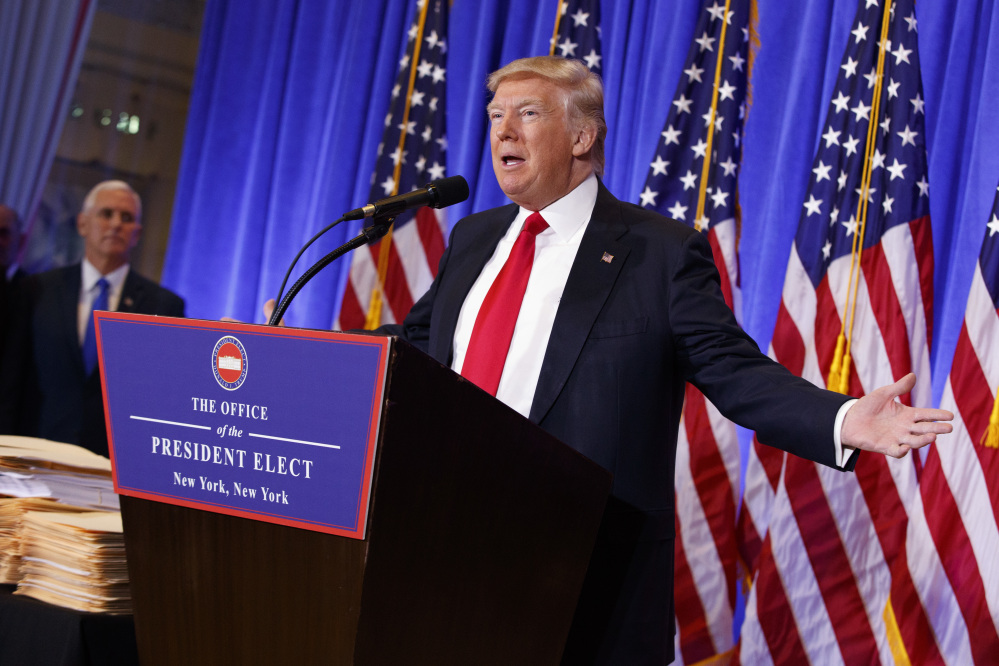NEW YORK — A shouting match with a reporter. A long unexplained prop. An unexpected interlude from a lawyer.
Donald Trump’s raucous first news conference as president-elect bore little resemblance to the usually staid and choreographed sessions with the occupant of the Oval Office. It was a 58-minute display of how some of the old rules of journalism will be tested in the Trump era.
More than 250 journalists packed Trump Tower for the celebrity businessman’s first full-fledged news conference since July, which was billed as a forum to discuss his separation from his business but quickly turned into a loud, wide-ranging free-for-all about U.S. intelligence, Russian hacking and, eventually, some of Trump’s policy plans after he takes office on Jan. 20.
Only one seat was saved by a Republican National Committee aide, a front-row spot for a reporter from Breitbart, the conservative news outlet until recently run by Trump senior adviser Steve Bannon. Other reporters scrambled to save their seats. Reporters shouted and waved their arms at Trump to get his attention, rather than the president calling on questioners from a list, as is often the practice.
Trump stood at a podium next to a pile of manila folders on a table. But only well into the press conference did he later explain the papers were documentation of his new business arrangement, details of which were explained only when Trump abruptly ceded the stage to his lawyer. Trump staffers blocked reporters from examining the folders.
The business announcement aside, Trump really came ready to do battle with press. Coming hours after news reports revealed intelligence officials had presented Trump with unsubstantiated and salacious allegations regarding his relationship to Russia, Trump and his team opened the news conference by condemning news organizations that disclosed details, calling out CNN and BuzzFeed as “disgraceful.”
He later refused to let CNN reporter Jim Acosta ask a question, saying, “Your organization is terrible” and demanding that he be “quiet” and allow another reporter a turn.
“I am not going to give you a question,” Trump said, ignoring Acosta’s requests. “You are fake news.”
Such exchanges became somewhat predictable during Trump’s campaign, during which Trump used his combative relationship with the press to fire up his supporters. But there are few recent examples of a sitting-president and a journalist abandoning decorum to duke it out on live television. The episode – which was condemned by The New York Press Club – was a sign that Trump may not intend to change his demeanor when he takes office later this month.
Trump isn’t the only one questioning BuzzFeed’s decision to publish the material. The dossier contains unproven information largely attributed to anonymous sources. The Associated Press has not authenticated any of the claims and Trump has strongly denied all of the accusations.
A CNN spokesman said in a statement: “We are fully confident in our reporting. It represents the core of what the First Amendment protects, informing the people of the inner workings of their government.”
BuzzFeed News’ editor-in-chief said in a statement that the online outlet published the document because its mission is to be “transparent in our journalism.”
In turn, Trump was transparent in how he plans to deal with this press corps.
When he called on the Breitbart reporter, he was asked his thoughts on media ethics and so-called “fake news.”
“Some of the media outlets that I deal with are fake news more so than anybody. I could name them, but I won’t bother, but you have a few sitting right in front of us. They’re very, very dishonest people, but I think it’s just something we’re going to have to live with,” he said. “I guess the advantage I have is that I can speak back.”
Send questions/comments to the editors.



Comments are no longer available on this story